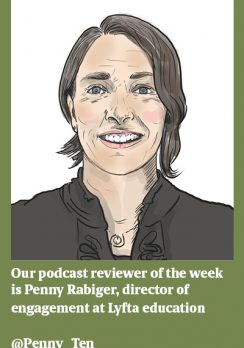This half term’s selection of podcasts focuses on LGBT+ representation in schools, from inclusion and anti-bullying to transgender rights
@taylormapps
This episode focuses on ensuring everyone can show up and be themselves
This podcast series shares creative and inspiring learning in schools. The episode I have chosen features Shaun Dellenty, who has been an educator for 20 years and is probably best known for his ‘Inclusion for All’ programme. This is something he devised in response to the homophobic bullying he witnessed in the school where he was deputy headteacher. To be exact, 75 per cent of pupils they surveyed in key stages 1 and 2 said that they had directly experienced homophobic bullying and language on a daily basis.
The episode, A Whole School Approach to LGBT+ Inclusion, is exactly what the title says, and focuses on ensuring everyone can show up and be themselves in school ̶ as children, families, teachers and a part of the school community.
@tiecampaign
It is fascinating and horrifying in equal measure
This is a podcast series compiled by the charity Time for Inclusive Education (TIE), which works for LGBT-inclusive education in Scottish schools. The podcast covers LGBT history, current affairs, education, interviews and topical issues.
The episode I think is well worth starting with is the first of a three-part series on Section 28. This was the policy of banning “the promotion of homosexuality in schools” which was enacted in 1988. Echoes of it remain. See, for example, this recent book review in these pages. The push-back against anti-racism is also very redolent of the language and attitudes that led to it.
This year is the 21st anniversary of the repeal of this act in Scotland (three full years before England) and so it is fascinating and horrifying in equal measure to hear from educators who were impacted by it and fought against this act. Lest we forget…
@switchboardLGBT
This episode catches up with the changes happening around relationships and sex education
This podcast series covers stories from Britain’s LGBTQIA+ history and features conversations about being queer today. Sprinkled throughout are readings from the actual log books kept by the people taking calls on Switchboard, the national LGBTQIA+ helpline that has been going for more than 40 years.
As historical artefacts, these are fascinating in themselves. The episode I have selected is part of the series that sees presenters Tash and Adam read log book entries and hear stories about growing up, looking for help and even a teenager who took the government to court. They also catch up with the changes happening around relationships and sex education in schools right now, via Kaley Foran from The Key.
@OutCastingMedia
It’s lovely to hear from a young person who could be in any teacher’s classroom
This American public radio LGBTQ youth programme is run by young people and is heard on over 50 public radio stations in the United States. The show covers a range of issues around LGBTQ+ education.
The episode I have chosen features Lucas, who talks about why it’s important for everyone to be able to express themselves, and why this can be extra hard for LGBTQ+ young people at school. He looks at a positive experience that came out of Covid quarantine and home schooling. It’s lovely to hear from a young person who could indeed be in any teacher’s classroom ̶ or at home, trying out new outfits instead…
@PopnOlly
This one is really important for schools trying to ensure that they are friendly to all humans
This is a podcast that explores the best practices for an LGBT+ and equality inclusive education. With guest speakers, tips and advice, Equality Education describes itself as a show for teachers, parents or anyone who believes in a kinder, more accepting society for future generations. It’s been particularly tough on young people recently, so I think we can all get with that agenda.
The episode I have selected is an enlightening discussion with Lui Asquith, who is legal and policy and operations manager at Mermaids, the charity that supports transgender and gender-variant children, young people and their families. Simply put, it is a really important one for schools trying to ensure that they are friendly to all humans.













Your thoughts